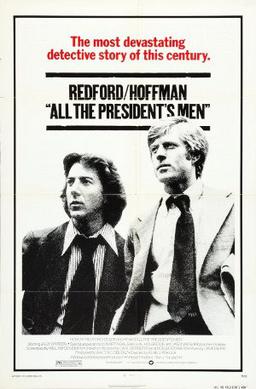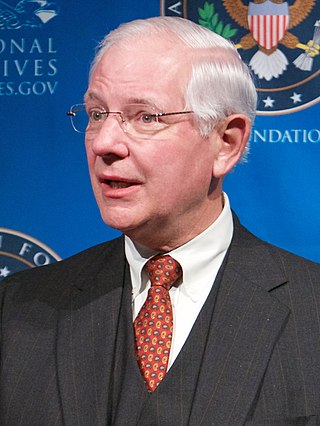
The Watergate scandal was a major political scandal in the United States involving the administration of President Richard Nixon which began in 1972 and ultimately led to Nixon's resignation in 1974. It revolved around members of a group associated with Nixon's 1972 re-election campaign breaking into and planting listening devices in the Democratic National Committee headquarters at the Watergate Office Building in Washington, D.C., on June 17, 1972, and Nixon's later attempts to hide his administration's involvement.

Harry Robbins "Bob" Haldeman was an American political aide and businessman, best known for his service as White House Chief of Staff to President Richard Nixon and his consequent involvement in the Watergate scandal.

John Daniel Ehrlichman was an American political aide who served as White House Counsel and Assistant to the President for Domestic Affairs under President Richard Nixon. Ehrlichman was an important influence on Nixon's domestic policy, coaching him on issues and enlisting his support for environmental initiatives.

The "Saturday Night Massacre" was a series of resignations over the dismissal of special prosecutor Archibald Cox that took place in the United States Department of Justice during the Watergate scandal in 1973. The events followed the refusal by Cox to drop a subpoena for the Nixon White House tapes at President Richard Nixon's request.

Louis Patrick Gray III was acting director of the Federal Bureau of Investigation (FBI) from May 3, 1972, to April 27, 1973. During this time, the FBI was in charge of the initial investigation into the burglaries that sparked the Watergate scandal, which eventually led to the resignation of President Nixon. Gray was nominated as permanent director by Nixon on February 15, 1973, but failed to win Senate confirmation. He resigned as acting director on April 27, 1973, after admitting to destroying documents that had come from convicted Watergate conspirator E. Howard Hunt's safe—documents received on June 28, 1972, 11 days after the Watergate burglary, and given to Gray by White House counsel John Dean.

John Wesley Dean III is a disbarred American attorney who served as White House Counsel for U.S. President Richard Nixon from July 1970 until April 1973. Dean is known for his role in the cover-up of the Watergate scandal and his subsequent testimony to Congress as a witness. His guilty plea to a single felony in exchange for becoming a key witness for the prosecution ultimately resulted in a reduced sentence, which he served at Fort Holabird outside Baltimore, Maryland. After his plea, he was disbarred.

Frank Wills was an American security guard best known for his role in foiling the June 17 1972 break-in at the Democratic National Committee inside the Watergate complex in Washington, D.C. Then 24, Wills called the police after discovering that locks at the complex had been tampered with. Five men were arrested inside the Democratic headquarters, which they had planned to bug. The arrests triggered the Watergate scandal and eventually the resignation of President Richard M. Nixon in 1974.

The Watergate complex is a group of six buildings in the Foggy Bottom neighborhood of Washington, D.C., United States. It is primarily a development of residences in cooperative ownership, but it also has a hotel and an office building. Covering a total of 10 acres just north of the John F. Kennedy Center for the Performing Arts, the buildings include:

The Senate Watergate Committee, known officially as the Select Committee on Presidential Campaign Activities, was a special committee established by the United States Senate, S.Res. 60, in 1973, to investigate the Watergate scandal, with the power to investigate the break-in at the Democratic National Committee (DNC) headquarters at the Watergate office complex in Washington, D.C., and any subsequent cover-up of criminal activity, as well as "all other illegal, improper, or unethical conduct occurring during the controversial 1972 presidential election, including political espionage and campaign finance practices".

The Richard Nixon Presidential Library and Museum is the presidential library and burial site of Richard Milhous Nixon, the 37th president of the United States (1969–1974), and his wife Pat Nixon.

The Watergate scandal refers to the burglary and illegal wiretapping of the headquarters of the Democratic National Committee, in the Watergate complex by members of President Richard Nixon's re-election campaign, and the subsequent cover-up of the break-in resulting in Nixon's resignation on August 9, 1974, as well as other abuses of power by the Nixon White House that were discovered during the course of the scandal.
Audio recordings of conversations between U.S. President Richard Nixon and Nixon administration officials, Nixon family members, and White House staff surfaced during the Watergate scandal in 1973 and 1974, leading to Nixon's resignation.
"A Head in the Polls" is the third episode in the second season of the American animated television series Futurama, and the 16th episode of the series overall. It originally aired on the Fox network in the United States on December 12, 1999. The episode was written by J. Stewart Burns and directed by Bret Haaland. Claudia Schiffer makes a guest appearance as herself. The title is a pun on the common phrase "Ahead in the polls".

All the President's Men is a 1976 American biographical political thriller film about the Watergate scandal that brought down the presidency of Richard Nixon. Directed by Alan J. Pakula, with a screenplay by William Goldman, it is based on the 1974 non-fiction book by Carl Bernstein and Bob Woodward, the two journalists investigating the scandal for The Washington Post.

The Missing White House Tapes is a comedy album released as a satiric commentary on the Watergate scandal and is a spin-off from National Lampoon magazine. The recording was produced by Irving Kirsch and Vic Dinnerstein. It was released as a single on Blue Thumb Records in 1973. It was expanded into an album, which was subsequently nominated for a Grammy Award as Best Comedy Recording of the year.

Dick is a 1999 comedy film directed by Andrew Fleming from a script he co-wrote with Sheryl Longin. It is a comic reimagining of the Watergate scandal which ended the presidency of Richard Nixon and features several cast members from Saturday Night Live and The Kids in the Hall. Kirsten Dunst and Michelle Williams star as Betsy and Arlene, two warm-hearted but unworldly 15-year-old friends, who – through various arbitrary circumstances – become the legendary "Deep Throat" figure who played a key role in bringing down the presidency of Nixon. At the time of the film's release, the real identity of Deep Throat was not yet known to the public.

Geoffrey Carroll Shepard is an American lawyer, author and lecturer.

Our Nixon is an all-archival documentary providing a view of the Nixon presidency through the use of Super-8 format home movies filmed by top Nixon aides H.R. Haldeman, Dwight Chapin and John Ehrlichman, combined with other historical material such as interviews, oral histories and news clips. It was directed by Penny Lane.
Richard Nixon, the 37th President of the United States, has inspired or been portrayed in numerous cultural works.
Watergate cake is a pistachio cake popular in the U.S. which shares its name with the Watergate scandal of the 1970s, although the name's origin is not clear. The cake pre-dates Watergate salad, a dessert made with similar ingredients including pistachio pudding.












